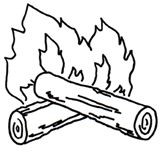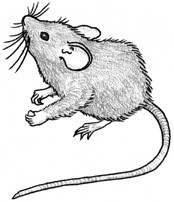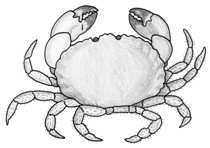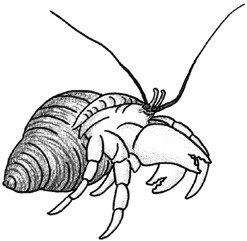
H - h
ha1 [ha] pps. you (Pl): 2nd plural Subject personal pronoun, associated to Irrealis mood; vous: pronom personnel sujet 2ème pluriel, associé au mode Irrealis.
▪ Ha v̈a, ha v̈a, ha ku r̄e ai jo val jo holo-ho. ‘(all of you) go and heat some water until it's really boiling hot!’ ‘Allez, allez, faites chauffer de l'eau, pour qu'elle soit bien bouillante !’
▪ Hoto! Vara ham rongo Siho mo avu mo sna mo ulo mo re 'Jiujiu', ale kam̈im ha soro ha re 'Korongkoto korongkoto'! ‘Hermit-crabs! If you happen to hear a Kingfisher fly here and sing "Tsiwtsiw", you will have to say "Korongkoto korongkoto"!’
ha2 [ha] pps. they: 3rd plural Subject personal pronoun, associated to Irrealis mood; ils, elles: pronom personnel sujet 3ème pl. associé au mode Irrealis.
▪ Mo je rongo ha le sivo Raki mo re m̈ar̄a pana ha jolo lo r̄as. ‘They don't want to come to Araki any more, for fear they might drown in the sea.’ ‘Ils n'ont plus envie de venir à Araki, sous prétexte qu'ils risquent de mourir noyés en mer.’
▪ Vara mo sivo lo pere vosa, nko ha pa nak-i-ko ha pa hani-ko. ‘If (the reed) falls on to a Terminalia tree, (this is the sign that) they will kill you, they will eat you (i.e. You will be killed and eaten by someone).’
ha3 [ha] vi. go, to be found (in a particular place). Generally accompanies the question v̈e "where?"; être allé, se trouver (dans tel endroit). Accompagne généralement l'interrogatif v̈e "où?".
▪ Paniavu nohosu nam voli-a mo ha v̈e? ‘The pineapple I bought, where did it go?’ ‘L'ananas que j'ai acheté, où est-il (passé)?’
► Syn: r̄oho.
► See: v̈a.
◈ Etym. ca ‘go’.
ha4 [ha] rad. tree, wood. Used when the name of the tree species is not specified; arbre, bois.
▪ vi-levu ‘a breadfruit tree’.
▪ vi-ha ‘a tree’.
▪ ra-per̄a ‘a taro leaf’.
▪ ra-ha ‘a leaf’. Generic term for plants; features in nouns vi-ha "tree, wood" and ra-ha "leaf".
▷ Radical générique des végétaux, présent notamment dans vi-ha "arbre" et ra-ha "feuilles".
◈ Etym. *kayu ‘tree, (piece of) wood’.
ha~5 [ha] pos. Possessive Classifier for food; Classificateur Possessif lié à la nourriture.
▪ Hariv mo lesi jam ha-ni m̈ala, mo han-i-a. ‘The rat saw a piece of yam (reserved) for the hawk, and ate it.’ ‘Le rat vit un morceau d'igname (réservé) au faucon, et le dévora.’
▪ Rai m̈aji mo han-i-a ha-ku hina! ‘The birds have eaten my meal!’ ‘Les oiseaux ont mangé mon repas !’
▪ Ver̄asi-ku mo r̄angisi ha-na, nam var̄i-a nam sle nia mo han-i-a. ‘My younger sister was crying for her food, this is why I gave her [the breadfruit biscuit] for her to eat.’
◈ Etym. *ka-.
 |
| hae ‘kava’ |
hae [hae] n. kava, a root from which a narcotic drink is extracted; kava, racine dont on extrait une boisson narcotique du même nom. Piper methysticum.
▪ Nam rongo hae mo nak-i-á. ‘I feel the effect of kava. [lit. I feel kava is hitting me]’. ‘Je sens l'effet du kava.’
▪ Kam̈am Raki kam je levsei inumi-a hae. ‘We, people of Araki, do not [know how to] drink kava.’ ‘...’
▷ Cet usage n'a jamais été très développé à Araki. The use of drinking kava was never common on Araki island, or was lost a long time ago.
◈ Etym. *kawa.
haiono [haiono] num. six; six.
◈ Etym. *onom.
haip̈ir̄u [hait̼iru] num. seven; sept.
◈ Etym. *pitu.
haisua [haisua] num. nine; neuf.
◈ Etym. *siwa.
haj [hatɕ] vt. Tr: haji-. [Subj: body part] hurt, ache; be painful; [partie du corps] faire mal, être douloureux.
▪ Jojole-ku mo haj-i-á. ‘My throat hurts.’ ‘J'ai mal à la gorge.’
◈ Etym. cazia.
hajavua [haʧaβua] adj. 1 • [+plural referent] a lot, plenty; too many; nombreux.
▪ Om v̈ev̈e hina hajavua! ‘You work too much [lit. you do (too) many things]’. ‘Tu travailles trop !’
2 • [+generic, singular referent] a lot, very much; too much.
▪ Nam jom̈i hajavua. ‘I am so sorry!’ ‘Je suis très triste / désolé.’
hali [hali] ni. nape of the neck; nuque.
▪ Hali-m mo haj-i-ko vo mo je-r̄e? ‘Is [the nape of] your neck hurting [or not]?’
► See: ua ‘neck’ ‘cou’.
ham [ham] pps. you (Pl): 2nd plural Subject personal pronoun, associated to Realis mood; vous: pronom personnel sujet 2ème pluriel, associé au mode Realis.
▪ Ham holo r̄o? ‘Are you alright?’
▪ Ham meje. ‘Thank you [lit. Y'all are thanked].’
► See: ha1.
ham̈ali [han̼ali] n. ~ ham̈al. men's clubhouse (Bisl. nakamal), where eminent men (r̄aju lap̈a) traditionally meet and take important decisions; maison collective des hommes.
▪ Ham̈ali, ima-na ra r̄aju povi. ‘The nakamal is the house for all men.’ ‘Le nakamal, c'est la maison de tous les hommes.’
▪ Om r̄e v̈a mo iso lo ham̈ali? ‘Have you ever entered the nakamal?’ ‘Es-tu déjà entré au nakamal?’
◈ Etym. *kamali(ʀ).
han [han] vt. Tr: hani-. eat, devour; manger.
▪ Nija jo pa han r̄e sa? ‘What are we going to eat?’ ‘Qu'allons-nous manger ?’
▪ Mara Tanna hase-ra, nira mo levse han-i-a viri. ‘Only the inhabitants of Tanna eat dogs.’ ‘Seuls les habitants de Tanna ont l'habitude de manger du chien.’
▪ Mo m̈ar̄ahu m̈ar̄a r̄am̈ar̄e mo r̄e han-i-a r̄ap̈ala-na mo iso. ‘He was terrified at the idea that his friend had just been devoured by a devil.’ ‘Il était terrorisé, à l'idée que son ami venait d'être dévoré par un démon.’
▪ Vara mo sivo lo pere vosa, nko ha pa nak-i-ko ha pa hani-ko. ‘If (the reed) falls on to a Terminalia tree, (this is the sign that) you will be killed and eaten (by your enemies).’
► See: ha- ‘PosCl for food’.
◈ Etym. *kani.
hanhan [hanhan] vi. eat (intr.), have lunch or dinner; manger.
▪ Om r̄e hanhan mo iso? ‘Have you already eaten?’ ‘Tu as déjà mangé ?’
▪ Mo re jo hanhan peresi-á. ‘He wants to eat with me.’ ‘Il veut manger avec moi.’
▪ Jo re o r̄ang jo iso, o pa hanhan. ‘If / When you finish crying, you can have your dinner.’ ‘Si tu finis de pleurer, tu pourras manger.’
◆ n. 1 • food, anything edible; objet comestible, nourriture.
▪ Lo ran Raki mo re hanhan jo pa je-r̄e... ‘Whenever Araki lacks food...’ ‘Chaque fois que, sur Araki, on n'a plus rien à manger...’
▪ V̈er̄al ne mo je v̈er̄al hanhan. ‘This banana is not edible [lit. not a "food-banana"].’ ‘Cette banane-ci n'est pas une banane comestible.’
2 • act of eating, dinner, esp. in a social group: hence party, feast; acte de manger, repas; fête.
▪ Mo re lo ran mo hese, mo v̈ei-a hanhan mo hese Raki. ‘The legend says that one day, there was a big feast in Araki.’ ‘On raconte qu'un jour, ils firent une grande fête à Araki.’
◈ Etym. *kanikani.
hapa [hapa] ni. ~ hap̈a (?). [bird] wing; aile.
◈ Etym. *kaba-u; *kapak.
 |
| hapu ‘fire’ |
hapu [hapu] n. ~ hap. fire; feu.
▪ Hapu mo ung. ‘The fire is burning.’ ‘Le feu se consume.’
▪ O polo r̄e hap lap̈a! ‘Please light a big fire!’ ‘Fais un grand feu!’
▪ P̈isu-ku koru lo hapu. ‘I burnt my fingers in the fire.’ ‘Je me suis brûlé les doigts sur le feu.’
◈ Etym. *kabu ‘fire, firewood’.
hap̈ani [hat̼ani] n. sail of a boat; voile (de bateau).
◈ Etym. *kabani.
hap̈asi [hat̼asi] ni. [plant] stem; [plante] tige.
▪ Mo var̄i-a hap̈asi via, mo r̄ai-a aka-na inia. ‘(The Rat) took the stem of a wild taro, and cut himself a canoe out of it.’ ‘(Le rat) se tailla une pirogue, en utilisant une tige de taro géant.’
► See: ranga ‘branch’; laho ‘trunk’; rau ‘leaf’.
hara [haɾa] adj. 1 • red; rouge.
▪ jam hahara ‘red yam (k.o. yam)’. ‘igname rouge (variété d'igname)’.
▪ Mo hara jojo. ‘It's dark red.’ ‘C'est rouge foncé.’
2 • [vulu 'hair'] red or blond; [vulu 'cheveux'] blond ou roux.
▪ Vulu-na mo hahara. ‘His hair is blond.’ ‘Il a les cheveux blonds.’
► See: para ‘white-haired’.
haraho [haɾaho] vi. [child, animal] crawl, walk on all fours; ramper.
▪ Lo ran mo hese, Siho mo varai Hotou mo re "Om haraho m̈alum!" ‘One day, Kingfisher said to Hermit-crab "You crawl so slowly!"’. ‘Un jour, le Martin-pêcheur dit au Bernard-l'ermite "Comme tu es lent à ramper!"’.
► See: v̈anov̈ano ‘walk’.
◈ Etym. *karaka ‘climb, crawl’; *kaʀaka.
 |
| harivi ‘rat’ |
harivi [haɾiβi] n. ~ hariv. rat; rat.
▪ Kesi hariv nira-n huir̄a mo rua meresai. ‘Today the rat and the octopus are enemies.’
▪ Om lesi-a viji-n hariv nohoni mo sohe ranga vi-aru. ‘You can see the rat's tail resembles a branch of Casuarina.’ ‘Tu constates que la queue du rat ressemble à une branche de Casuarina.’
hariv tasale n. cat; chat.
hariv paurouro n. Notopteris macdonaldi. kind of flying-fox; variété de roussette.
► See: kara.
◈ Etym. *karivi ‘rat’.
har̄i [hari] vt. bite; mordre, [insectes+] piquer.
▪ P̈ahe mo har̄i-a sari-ku! ‘My leg got bitten by a shark!’ ‘Je me suis fait mordre la jambe par un requin !’
▪ Mohi mo levse har̄i-a r̄aju. ‘Mosquitoes bite [know how to bite men].’ ‘Les moustiques, ça pique [savent mordre les hommes]’.
◈ Etym. *kaʀa-ti; *kaʀat.
Har̄ua [harua] top. west, west wind; ouest, vent d'ouest. Probably a place-name.
hasan [hasan] vt. Tr: hasani-. light, set fire to <wood+>; allumer, mettre le feu à <bois+>.
▪ Mo var̄i-a rau vinini mo m̈a mo hasan-i-a mo ung lap̈a. ‘He took a palm-leaf from the palmtree, and made a big fire with it.’ ‘Il alla chercher une feuille de palmier, et alluma un feu qui brilla à grandes flammes.’
► See: suli ‘burn s.th.’; hapu ‘fire’.
hase~ [hase] s.adj. Adjective always followed by a possessive suffix, and generally associated to a preceding noun or pronoun; Adjectif toujours suivi par un suffixe possessif, normalement précédé par un nom ou un pronom.
1 • alone, only. Restricts the predicate to the Subject only; seul, uniquement. Permet de restreindre un prédicat au sujet de la phrase, et à lui seul.
▪ Mara Tanna hasera, nira mo levse han-i-a viri. ‘Only the people from/on Tanna are used to eating dogs.’ ‘Seuls les habitants de Tanna ont l'habitude de manger du chien.’
2 • by himself; esp. with no external help; soi-même, lui-même; partic. sans aide extérieure.
▪ Ranga viha mo lar̄e hase-na. ‘The branch of the tree broke itself (was not brought about by anyone)’. ‘La branche de l'arbre s'est cassée toute seule. (ce n'est l'action de personne)’.
▪ Nam ele no-m soro na hase-ku. ‘I learnt your language by myself.’ ‘J'ai appris ta langue par moi-même.’
haualu [haualu] num. eight; huit.
▪ pong haualu ‘in eight days' time’.
◈ Etym. *walu.
haur̄a [haura] adj. 1 • hard, solid; dur, solide.
▪ Par̄u haur̄a! ‘stubborn, pigheaded’. ‘Tête de mule [tête dure] !’
► See: sui-ha ‘strong’ ‘fort’.
2 • difficult, arduous, tough; difficile, ardu.
▪ M̈ar̄asala nene mo haur̄a, mo je ere jo holo-ho. ‘This door's difficult, it doesn't open easily.’ ‘Cette porte est dure, elle ne s'ouvre pas facilement.’
◈ Etym. *kayua (?) ‘strong’.
haviha [haβiha] n. Malay apple, Bisl. Nakavika; pomme canaque, Bisl. Nakavika. Syzygium malaccense.
◈ Etym. *kavika; *kapika.
havu [haβu] vt. cover, wrap; couvrir, recouvrir.
► Syn: tahavu.
havhavu m̈ar̄a~ ni. eyelid; la paupière.
havhavu pange~ ni. diaphragm; le diaphragme.
► Syn: havhavu r̄ali~ ‘gut-covering’ ‘recouvre-intestin’.
◈ Etym. *kavu-ti ‘wrap food, make laplap’.
 |
| hav̈e ‘crab’ |
hav̈e [hað̼e] n. crab, generic term; crabe.
▪ Mo rongo hav̈e mo hese mo r̄oho kia lolo-n viha hosun. ‘He heard a crab, which was there inside that tree.’ ‘Il ressentit la présence d'un crabe, qui se trouvait là dans cet arbre.’
◈ Etym. *kave; *kape.
hav̈ehav̈e [hað̼ehað̼e] ni. armpit; aisselle.
◈ Etym. have; *ʔavi-ŋa.
ha-6 [ha] pf. Ordinal; Ordinal.
1 • prefix associated with numbers to form ordinals (e.g. second, third); préfixe accolé aux nombres cardinaux, pour dériver les ordinaux.
▪ ha-r̄olu ‘third’.
▪ ha-v̈ar̄i ‘fourth’. Only with numbers from 2 to 5.
▷ Concerne les nombres de 2 à 5.
► See: muru ‘first’.
2 • prefix forming to name the days of the week, starting with the second day Tuesday; préfixe permettant de numéroter et nommer les jours de la semaine, à partir du deuxième jour mardi.
▪ Lo ha-rua ran, na pa lahi. ‘I will marry on (next) Tuesday.’ ‘Mardi (prochain), je me marie.’
▪ R̄av̈al wik, jo pa usa lo ha-lim̈a ran. ‘It will rain on Friday of next week.’ ‘La semaine prochaine, il pleuvra vendredi.’
► See: pong.
◈ Etym. *paka- (?) ‘Causative’.
heja [heʧa] adj. blue, green; bleu, vert.
▪ kere-heja ‘[blue-tail] Bluespot mullet, a fish’.
▪ Mo heja. ‘It is blue/green.’
◈ Etym. *keza.
heli [heli] vt. dig, make a hole; creuser.
▪ Nra mo heli-a koko lo jar̄auta. ‘They dig a hole on the shore.’
► See: kore2.
◈ Etym. *keli.
here [heɾe] adv. 1 • today, esp. future (vs. nahare, today past or present); aujourd'hui.
▪ Here, om re o sorohi-a sa? ‘What do you want to talk about today?’ ‘Aujourd'hui, de quoi veux-tu parler?’
▪ Here, na pa r̄uru jo aloalo. ‘Today I'll get up when the sun's out (I'll have a lie-in).’ ‘Aujourd'hui, je ne me lèverai que lorsqu'il fera bien soleil (Je ferai la grasse matinée).’
2 • [aspectual] forms the near future (hodiernal), e.g. in threats or promises; marque le Futur proche (hodiernal), par ex. dans les menaces ou les promesses.
▪ Here na pa p̈isu jurung-i-a aka-ja! ‘(In that case) I'll make a hole in this canoe!’ ‘(Puisque c'est comme ça) je vais faire un trou dans cette pirogue !’
hese [hese] num. one, Numeral. Usually preceded by a subject clitic; un, une.
▪ ajo jingo-hese ‘swordfish [fish with single beak]’. ‘espadon [poisson à un bec]’.
▪ Nar̄u-ku mo hese. ‘I have one child [my child is one].’
▷ Contrary to other numerals, hese may lack its subject clitic when Irrealis, at least in some exceptional contexts: Nam re na han r̄e v̈er̄ali (co) hese. I'd like to eat one banana [no more]..
► See: muru ‘first’.
mo hese loc. refers to a specific, though gen. indefinite, referent (vs. r̄e indefinite, non-specific article).
1 • [noun N + mo hese] a, an: indefinite, specific article.
▪ Mo rongo hav̈e mo hese mo r̄oho kia lolo-n viha hosun. ‘He felt (there was) a crab, grabbed it and threw it away.’ ‘Il ressentit la présence d'un crabe, qui se trouvait là dans cet arbre.’
▪ Spoemalao nia r̄aju mo hese mo levosai mo holo-ho. ‘Spoemalao is a man who is really clever.’ ‘Spoemalao, c'est un homme diablement rusé.’
▪ Lo ran mo hese, mo v̈ei-a hanhan mo hese Raki. ‘fr:One day, there was a big feast in Araki.’ ‘Un jour, ils firent une grande fête à Araki.’
▪ lo jara mo hese mo r̄ov-i-a mo re Ler̄uvahi ‘in a place called Leruvahi’. ‘dans un endroit que l'on appelle Leruvahi’.
2 • [used as a pronoun] one (of them); someone.
▪ Mo hese, mo r̄ov-i-a mo re Asvohinao. ‘There's another one (devil), who is called Asvohinao.’
▪ Mo lesi mo hese mo jiha. ‘He noticed that one (of the kids) had disappeared.’
3 • another one, someone else.
▪ Nanov nam rongo r̄aju mo hese mo var̄i-a ver̄e nohoni. ‘Yesterday, I heard someone else sing the same song (as you).’
► See: vavono ‘other’.
4 • [existential predicate] there is a (N). Esp. at the beginning of a story.
▪ V̈apa mo hese, kesini r̄avui lo ima-ku. ‘There is a cave, here close to my house.’
▪ P̈ir̄a hetehete mo hese nira-n ver̄oha-na. ‘(Once upon a time) there was a small girl with her sister.’
hetehete [hetehete] adj. 1 • small, little; petit, de faible importance.
▪ no-m ta hetehete ‘your paternal uncle [your little father]’. ‘ton oncle paternel [ton petit papa]’.
▪ Mo rongo leo-ro r̄o, mo v̈a, mo r̄a hetehete, mo je le rongo otom̈e. ‘At first we could hear their voices, but then they began to fade [become small] to such a point that we could no longer hear them.’ ‘D'abord, on entendait leurs voix ; mais peu à peu, celles-ci commencèrent à s'estomper, au point qu'on finit par ne plus les entendre.’ For several small objects, the adjective variri is used, a kind of plural form of hetehete.
▷ Pour des petits objets nombreux, on utilise l'adjectif variri, sorte de pluriel de hetehete.
2 • child. The singular form, "a child" substantivates the adjective "small" using hina ("thing"), or esp. mara; enfant. Au singulier, "un enfant" se dit en substantivant l'adjectif "petit" au moyen de hina ("chose"), ou partic. de mara (article).
▪ Mara hetehete mo hese mo r̄uru r̄o lo sala. ‘There's a child in the road.’ ‘Il y a un enfant sur le chemin.’
▪ Se mo sle-ko hina hetehete nohoni? ‘Whose child is this [who gave you this little thing]?’ ‘Qui t'a fait cet enfant [t'a donné cette petite chose] ?’
▷ In plural form, "children" is mara variri.
▷ Au pluriel, "les enfants" se traduit mara variri.
hija [hiʧa] ni. name of <s.o., s.th.>; nom.
▪ Nra vajaha mo r̄ov-i-a hija jara hosu mo re Ler̄uvahi. ‘Elders used to call [the name of] this place "Leruvahi".’ ‘Les anciens appelaient [le nom de] cet endroit "Leruvahi".’
▪ Hija-m se? ‘What [lit. who] is your name?’ ‘[ton nom est qui] Comment t'appelles-tu?’
► See: r̄ove.
◈ Etym. *kisa; *qasan ‘name’.
hilu [hilu] vi. ~ hil. 1 • stop during a movement; s'arrêter.
▪ Nam v̈a nam le hil nam le m̈a. ‘I was going (in that direction), but suddenly I stopped and came back.’
2 • [esp. speech, story] end, finish.
▪ Sorosoro ri mo hilu hosu. ‘This story stops here.’ ‘Cette histoire se termine ainsi.’
hina [hina] n. 1 • thing; chose.
▪ Hina nohosu om v̈ei-a mo je holoho. ‘What you did is not good!’ ‘Ce que tu as fait, ce n'est pas bien !’
▪ Mo v̈ei povi-a rai hina hosun. ‘He did all those things.’ ‘Il fit entièrement toutes ces choses.’
2 • enables certain indefinite constructions, referring to inanimate objects: r̄e hina "something [non-Spec.]", hina mo hese "something [Spec.]", hina salahese "a lot (of things)", sava hina "what (what thing)", hina tare "everything"; permet de construire certaines tournures indéfinies, renvoyant à des inanimés: r̄e hina "quelque chose [non-Spéc.]", hina mo hese "quelque chose [Spéc.]", hina salahese "beaucoup (de choses)", sava hina "quoi (quelle chose)", hina tare "tout".
▪ O pa levsei lo ran hosu sava hina jo pa m̈a isa-m. ‘You will learn, that very day, everything that will happen to you.’ ‘Tu sauras, le jour même, tout ce qui [quelle chose] t'arrivera.’
▪ Hina tare mo holo-ho. ‘Everything's alright (there's no problem).’ ‘Tout va bien (il n'y a aucun problème).’
► See: sa.
◆ excl. mark of hesitation: er, how do you say?; marque de l'hésitation: euh, comment dire?
▪ Hina — m̈ala mo re / hariv mo re... ‘Er — then the Hawk said / (sorry) the Rat said...’
◈ Etym. *kina-u.
hini~ [hini] vpr. ~ ini~; ni~. oblique preposition; à.
► See main entry: ni~.
◈ Etym. *kini- (?) ‘prepositional verb: instrumental, refective’.
hohono [hohono] adj. [plant+] wild, wild variety of (a given species); sauvage.
▪ pevu hohono ‘k.o. wild yam (see pevu)’.
▪ mol hohono ‘lemon [lit. wild orange]’.
► See: ila ‘wild (animal)’.
hojo1 [hoʧo] vt. wash, clean up; laver, nettoyer.
▪ Nam varai kam̈im nam re ha v̈a hojo lim̈a-m̈im, pan lim̈a-m̈im mo viriha r̄o. ‘I told you to wash your hands, but they are still black!’ ‘Je vous avais dit d'aller vous laver les mains, mais elles sont encore noires !’
▪ Ale, huri-na mo m̈ena, huri-na mo v̈a vahure, mo sivo mo hojohojo. Mo vahuren-i-a kavula-na, vahuren-i-a p̈iri-na... ‘Then, when the (breadfruit) skin is ripe, when it goes away, they come to clean it. They remove the pith, as well as the seeds...’ ‘Puis, lorsque la peau (du fruit-à-pain) est mûre, lorsqu'elle s'en va d'elle même, c'est alors qu'on vient les nettoyer. On enlève le pith, on enlève les graines...’
► See: karu ‘swim, bathe’.
hojo2 [hoʧo] ni. tooth, teeth; dent.
▪ Ha ngingisa na lesi hojo-m̈im! ‘Smile, show me your teeth!’ ‘Souriez, que je voie vos dents !’
▪ naho hojo-ku ‘my front teeth (canines + incisors)’. ‘mes dents de devant (canines + incisives)’.
▪ hojo po ‘pig's tusk’. ‘dent de cochon’.
► See: p̈ar̄i ‘molar’.
holo1 [holo] n. coconut, either the tree or the fruit; cocotier, noix de coco. Cocos nucifera.
▪ laho holo ‘trunk of a coconut tree’.
▪ Mo var̄i-a ra-holo mo plan-i-a kaur̄a hinia. ‘(once the breadfruit has been laid down), the coconut palms are thrown over them.’ ‘(après avoir déposé le fruit-à-pain) on prend des palmes de cocotiers et on les jette dessus.’
▪ Om r̄e viris lo holo? ‘Have you already squeezed out coconut milk ?’ ‘As-tu déjà pressé le coco ?’
► See: popo ‘germinated coconut’; kavura ‘coprah’.
holo2 [holo] adj. 1 • straight; droit, rectiligne.
► Syn: r̄aholo. See: holo3 ‘steer’ ‘diriger’.
2 • good, correct; bon, correct, bien.
▪ Korokoro mo je holoho. ‘Telling lies is not good.’ ‘Le mensonge, ce n'est pas bien.’
▪ Jom̈i-na mo je holo-ho. ‘[his thoughts were not good] He was worried.’ ‘[sa pensée n'était pas bonne] Il était soucieux.’
▷ Affirmative sentences always associate holo with the intensive suffix -ha (in its -ho form).
▷ L'énoncé affirmatif est toujours associé au suffixe intensif -ha (sous sa forme -ho).
3 • [s.o.] nice, kind, generous; [hum] gentil, aimable, généreux.
▪ Nam levsei-a, nia mo holo-ho vutiana. ‘I know him, he is a very nice person.’
4 • [s.th.] nice, pleasant; beau, agréable aux sens.
▪ Ver̄e hosun mo holo-ho. ‘This song is pleasant.’ ‘Cette chanson est magnifique.’
▪ Pona-m mo holo-ho. ‘You smell nice [your smell is good].’ ‘Tu sens bon [ton odeur est bonne]’.
5 • in good health, cured, recovered; en bonne santé, guéri.
▪ Om holo r̄o? — Nam holo-ho r̄o. ‘Are you OK? — Yes, I'm very well.’ ‘Tu vas bien? — Oui, je vais (très) bien.’
▪ Lo wik mo v̈a mo iso, nam rojorojo, kesi nam pa holo-ho. ‘Last week I was ill ; but now I'm well.’ ‘La semaine dernière, j'étais malade ; mais maintenant je suis guéri.’
► Ant: rojo.
6 • easy; aisé, facile.
▪ M̈ar̄asala nene mo haur̄a, mo je ere jo holo-ho. ‘This door's difficult, it doesn't open easily.’ ‘Cette porte est dure, elle ne s'ouvre pas facilement.’
7 • [in clause-chaining structure] very, really. Intensive value; bien, fortement. Valeur intensive.
▪ Spoemalao nia r̄aju mo hese mo levosai mo holo-ho. ‘Spoemalao is a man who is really clever.’ ‘Spoemalao, c'est un homme qui est diablement [bien] intelligent.’
▪ Ha ku r̄e ai jo val jo holo-ho. ‘Heat the water, until it is really boiling!’ ‘Faites chauffer de l'eau, pour qu'elle soit bien bouillante !’
► See: otom̈e; lap̈a; vutiana ‘Intensifier’.
holo3 [holo] vt. pilot, man <a boat>; piloter, gouverner, diriger (bateau).
▪ R̄e jo pele sna jo holo aka! ‘Someone come and man the boat !’ ‘Que quelqu'un vienne (maintenant) diriger le navire !’
► See: holo2 ‘straight’ ‘droit’.
honi [honi] dx. that, there: demonstrative referring to the domain of the addressee, and combined with several affixes, e.g. no-honi "that one", sivo-honi "down there", etc; Dx3.
horo1 [hoɾo] adp. cover, obstruct. Means that the effect of an action V1 is to block <a place>, hinder <s.o. else's movement>, prevent <s.o.> from doing s.th., etc; boucher la vue, fermer le passage.
▪ Mo r̄uru horo sala mo re ha nak-i-a. ‘They stood in the middle of the road [stood-blocked the road], with the intention of killing him.’ ‘Ils se dressent en travers de la route pour le tuer.’
▪ Pani Tumepu mo re mo r̄o horo m̈ar̄a-na. ‘(The island of Araki settled there) but Mount Tumepu started to complain that it was blocking its view [lit. that it stayed-blocked its eyes].’
◈ Etym. *koro ‘surround, cover, obstruct’.
horo2 [hoɾo] ni. [plant] root; racine.
▪ horo-no ‘its root’. ‘sa racine’.
◈ Etym. *kaʀo (?) ‘vine, rope’.
hosu [hosu] dx. that, there: Demonstrative for spatial designation; Dx:ci.
hotom̈e [hoton̼e] adp. ~ hotom̈e. well, properly; sometimes carries intensive meaning; bien, convenablement, comme il faut.
▪ Mo je le rongo otom̈e. ‘They cannot hear well any more.’
▪ Mo r̄ai-a aka inia, mo v̈e otom̈e sohe aka. ‘He carved himself a canoe, just as if it were a real canoe. [lit. he made it properly like a canoe]’. ‘Il se tailla une pirogue, faisant tout ce qu'il fallait pour en faire une bonne. [il la fit bien comme une pirogue]’.
▪ Mo huren-i-a lo r̄asi mo visi-a mo visi-a otom̈e. ‘He dragged (his canoe) down to the sea, and tied it fast [lit. tied it well].’ ‘Il tira (sa pirogue) vers la mer, puis l'attacha complètement.’
 |
| hotou ‘hermit-crab’ |
hotou [hotou] n. ~ hoto; hatou. Hermit crab, tiny crustacean which lodges inside shells; Pagure ou Bernard-l'ermite, petit crustacé qui se loge dans des coquillages. Pagurus spp.
▪ Lo ran mo hese, Siho mo varai Hotou mo re "Om haraho m̈alum! ‘One day, Kingfisher said to Hermit-crab "You crawl so slowly!"’. ‘Un jour, le Martin-pêcheur dit au Bernard-l'ermite "Comme tu es lent à ramper!"’.
◈ Etym. *katou.
houoji [houotɕi] n. k.o. banana, growing upwards; sorte de banane, croissant vers le haut. Musa spp.
► See: v̈er̄ali ‘banana’.
hovi [hoβi] ni. eczema or scabies, skin disease causing itching and serious skin lesion; eczéma ou gale, maladie de peau provoquant des démangeaisons et de graves lésions de la peau.
▪ Hovi-na mo vsovso-ho mo tahav nia. ‘His scabies was grimy and covered him all over.’ ‘Sa gale était crasseuse et le recouvrait entièrement.’
◆ vi. scabious, affected with scabies; galeux, qui a la gale, eczémateux.
▪ Pan r̄aju hosun mo hovhovi, hovi-na mo hovi langalanga. ‘It happened that this man had scabies, which caused his skin to drop off in pieces.’ ‘Or, ce jeune homme avait la gale, une gale qui faisait partir sa peau en lambeaux.’
◈ Etym. gov ‘a man full of sores’.
 |
| huep̈e ‘Ducula pacifica’ |
huep̈e [huet̼e] n. pigeon; more spec. Pacific Imperial Pigeon, 40 cm; pigeon; plus préc. Carpophage Pacifique, Notou des îles, 40 cm. Ducula pacifica.
▪
◈ Etym. <°kueba; *kuiba ‘Pacific pigeon’; *ku(i)ba.
 |
| huir̄a ‘octopus’ |
huir̄a [huira] n. octopus, squid; poulpe.
▪ Niko, om sohe huir̄a. ‘You're like an octopus. (you are fickle, inconstant)’. ‘Toi, tu es comme un poulpe. (tu es changeant, inconstant)’.
▪ Kesi hariv nira-n huir̄a mo rua meresai. ‘Today the rat and the octopus are enemies.’
◈ Etym. *kuʀita.
humi [humi] ni. beard; moustache (?); barbe, moustache.
humi-ra n. Mulloidichthys flavolineatus. Yellowstripe Goatfish, Bisl. Mustasfis: reef fish, 22 cm; Surmulet cordon-jaune (angl. Goatfish), poisson récifal, 22 cm.
◈ Etym. *kumwi; *kumi ‘beard’.
hura [huɾa] n. Indian mulberry, Bisl. Yalatri; Mûrier indien ou fromager, Bisl. Yalatri. Morinda citrifolia.
◈ Etym. *kurat.
hurar̄a [huɾara] n. 1 • dirt, filth; saleté, crasse.
▪ Hurar̄a mo tahav nia tep. ‘The table was covered with filth.’ ‘La saleté recouvre la table.’
► See: huraurar̄a; lumiha.
2 • forest, bush, wild area (vs. village); forêt, brousse, endroit sauvage (opp. village).
▪ Via nohoni mo r̄oho r̄o lo hurar̄a. ‘The giant taro, that grows in the forest / in the mountains.’ ‘Le taro géant, celui qui pousse en forêt / en montagne.’
hurar̄a jovo n. deep forest; forêt.
huraurar̄a [huɾauɾara] ni. crumbs, small particles of dirt; miettes, saletés.
▪ M̈ala mo lesi-a huraurar̄a-ni jam ri mo r̄oho r̄o lo hojo-no. ‘The hawk saw particles of yam stuck between his (the rat's) teeth.’ ‘Le faucon vit les miettes d'igname qui étaient restées entre ses dents (du rat).’
▪ Nam varai kam̈im nam re ha v̈a hojo lim̈a-m̈im, pan lim̈a-m̈im mo lumiha, huraurar̄a mo r̄oho r̄o nia. ‘I told you to wash your hands, but they are still dirty, there is still some dirt on them.’ ‘Je vous avais dit d'aller vous laver les mains, mais elles sont encore sales, encore recouvertes de saleté.’
▷ Reduplication of hurar̄a.
▷ Redoublement de hurar̄a.
huren [huɾen] vt. 1 • put, place; dispose, arrange; mettre, placer; disposer.
▪ Mo var̄i-a no-no rip̈a, no-no sip̈a, m̈aja, huren-i-a lo aka-na. ‘He took his axe, his knife, his club and put them into his canoe.’ ‘Il prit sa hache, son couteau, sa massue, et les mit dans sa pirogue.’
▪ Mo var̄i-a vira haviha mo huren-i-a lo par̄u-na. ‘He picked an apple blossom and put it on his head.’ ‘Il prit une fleur de pommier, et il se la mit sur la tête.’
▪ Mo huren-i-a lo r̄asi mo visi-a mo visi-a otom̈e. ‘He dragged (his canoe) down to the sea, and tied it fast.’ ‘Il tira (sa pirogue) vers la mer, puis l'attacha complètement.’
2 • drop off, set down; déposer.
▪ Mo v̈a v̈a mo v̈a r̄kel-i-a tar̄auta mo huren-i Hariv. ‘(The Octopus) continued to swim until he reached the shore, where he dropped off the Rat.’ ‘(le poulpe) continua à nager, nager, jusqu'à ce qu'il atteignit la rive, où il déposa le rat.’
3 • put, lay <one's head, hand +> somewhere; appliquer.
▪ Ha huren pultan-i-a par̄um̈im. ‘Arrange your heads to be all in the same place.’ ‘Placez tous vos têtes au même endroit.’
▪ M̈ala mo var̄i-a p̈isu-na mo huren-i-a mo sivo lo hap̈asi via, mo majuru. ‘[lit. the hawk took its fingers and put them on the branch…] With its huge claws, the hawk seized the taro branch and tore it to pieces.’ ‘[lt. le faucon prit ses doigts et les mit sur la tige] De ses grandes serres, le faucon saisit la tige de taro, et la déchira complètement.’
huri [huɾi] n. skin; [tree] bark; peau, [arbre] écorce.
▪ Mo m̈ar̄e, huri-na prongo peresi-a sui-na. ‘He was dead, with nothing more than skin on his bones.’ ‘Il était mort, et n'avait plus que la peau sur les os.’
▪ Ale, huri-na mo m̈ena, huri-na mo v̈a vahure, mo sivo mo hojohojo. ‘Then, when the (breadfruit) skin is ripe, when it drops off by itself, that's when it is cleaned.’ ‘Puis, lorsque la peau (du fruit-à-pain) est mûre, lorsqu'elle s'en va d'elle même, c'est alors qu'on vient les nettoyer.’
◈ Etym. *kuli; *kulit.
huri-vivi [huɾiβiβi] ni. lips; lèvres.
▪ hurivivi-ku kar̄ano ‘my lower lip’. ‘ma lèvre inférieure’.
▪ hurivivi-ku kaur̄a ‘my upper lip (see ngoringori)’. ‘ma lèvre supérieure’.
► See: huri ‘skin’ ‘peau’; vivi ‘lips (anc.)’ ‘lèvres’.
hur̄u [huru] n. louse; pou.
◈ Etym. *kutu.